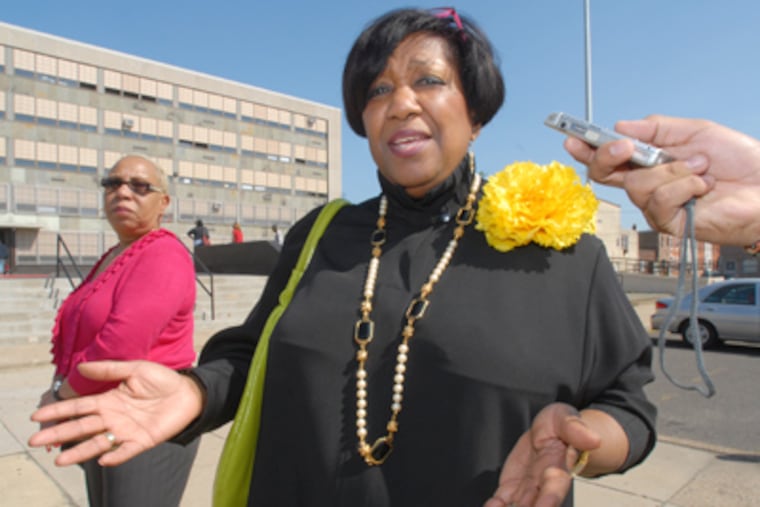Real school reform finally?
I must confess: I miss Arlene Ackerman. Her piquant mix of narcissism and arrogant authoritarianism made the School District so much fun to write about. Day to day, you never knew what bone-headed, tone-deaf thing she would say or do. Remember how she handled the beating of Asian students at South Philly High by blaming the victims? What a hoot she was.

I must confess: I miss Arlene Ackerman.
Her piquant mix of narcissism and arrogant authoritarianism made the School District so much fun to write about. Day to day, you never knew what bone-headed, tone-deaf thing she would say or do. Remember how she handled the beating of Asian students at South Philly High by blaming the victims? What a hoot she was.
At the same time, I feel guilty. By focusing on Ackerman, we in the media often ignored powerful subterranean forces that are reshaping basic education in Philadelphia.
But we can't deny the power of the changes under way. Looking five years into the future, it is easy to imagine an educational system very different from today's, and vastly changed from 2000's.
In 2000, if you drew a pie chart that defined where Philadelphia children went to school, there would be small slices for private and parochial schools, but most of the pie would read "public schools."
Like all monopolies, the School District was resistant to change. Superintendents came and went, each promising educational reform, but not much of it stuck. We have been in reform mode since the hiring of Superintendent Mark Shedd in 1966, which means we are celebrating our 45th year of school reform. Maybe we should have a party to mark the occasion.
The rhetoric of reform aside, most adults in the system - with the notable exception of parents - were satisfied with the status quo.
As Ackerman herself wrote in these pages in October: "I've come to a sad realization. Real reform will never come from within the system because too many powers that be (the teachers' union, politicians, consultants, vendors, etc.) have a vested interested in maintaining the status quo that is failing our children."
You could call that sour grapes (after all, she was forced to leave), but I have heard similar laments from superintendents, school board members, and others who have tried to effect change in the district. As one former school official put it: "Everyone talks about the kids . . . but really it's all about the jobs."
About 15 years ago, a group of politicians, parents, and educational reformers came to the conclusion that serious reform could not take place within the system. They began to advocate for vouchers and charter schools.
Gov. Tom Ridge favored vouchers and came thisclose to getting a bill passed in the 1990s. Ridge had national political aspirations and wanted some educational reform to his credit, so he next championed charters - publicly funded but independently run schools. When the charter law passed in 1997, no one thought it would amount to much. The teachers' unions went along with the idea as less injurious to their monopoly than vouchers. That was a mistake.
People within the public school system underestimated the lure of charters among dissatisfied parents. Whenever one opened, parents would flock to it. Supply increased to meet demand. By 2000, there were 12,000 students enrolled in Philadelphia charters. Today, there are 41,000. And there are thousands on waiting lists. By 2015, if current trends continue, the number could rise to 60,000 or higher.
If Gov. Corbett's plan to pass vouchers becomes law - and the odds seem to favor at least some version passing next year - it will have a dramatic effect, stanching the steady losses in enrollment in Catholic schools and increasing the share of non-Catholics enrolling their children in parish schools. (As of today, 27 percent of students in Catholic elementary schools in Philadelphia are non-Catholics.)
This is what makes the Great Schools Compact a watershed document. Signed last month by Mayor Nutter, new School Reform Commission Chair Pedro Ramos, and charter and state education leaders, it promises a new approach to school reform with less emphasis on systems and more on results.
The six-page document doesn't come out and say it, but it effectively calls for an end to the School District's monopoly on education and for expanding real school choice for parents.
It embraces charter schools as an alternative to district-run schools and promises to foster their growth and development. And it calls for a regimen of improvement - for charters and public schools - that is transparent and uniform. Schools will have to meet goals; if they do not, someone else will be brought in to do it.
A ceremony to accept a $100,000 Gates Foundation grant to help pay for planning implementation of the compact was held last week at Stetson Middle School. The setting was significant. Stetson, in North Philadelphia, was a failing, persistently dangerous public school handed over to the Latino education group Aspira.
Aspira changed Stetson to a charter, shed the old rules and restraints, and within a year staged a remarkable turnaround.
The compact says that if this kind of turnaround can be done at other schools, let's stop the internecine fights over who can educate students best. Let's just do it.